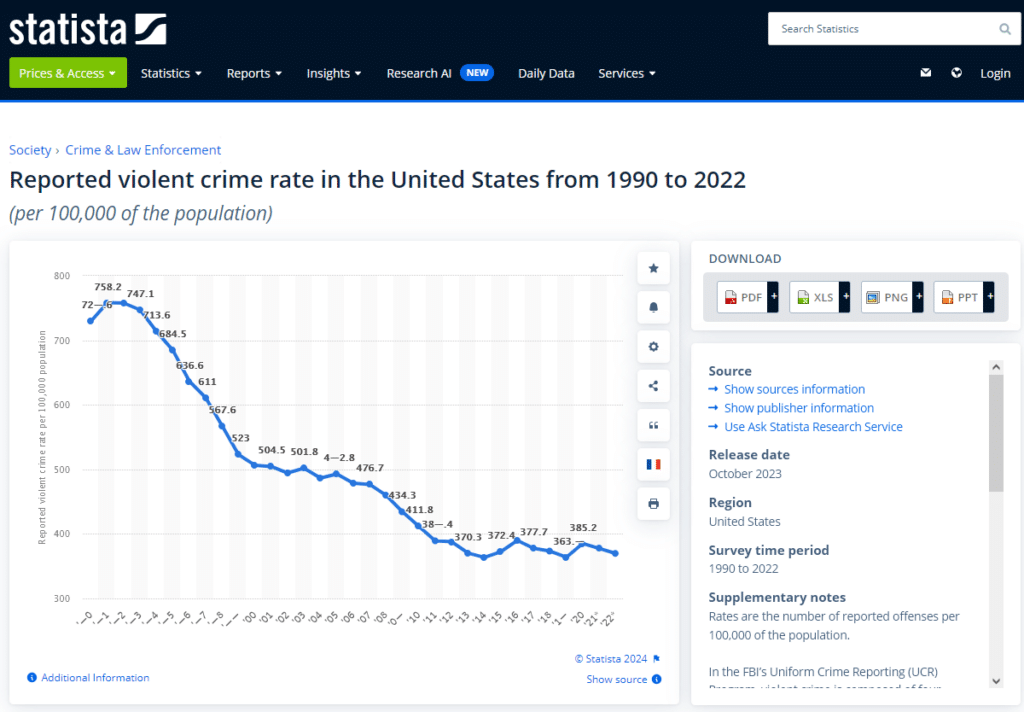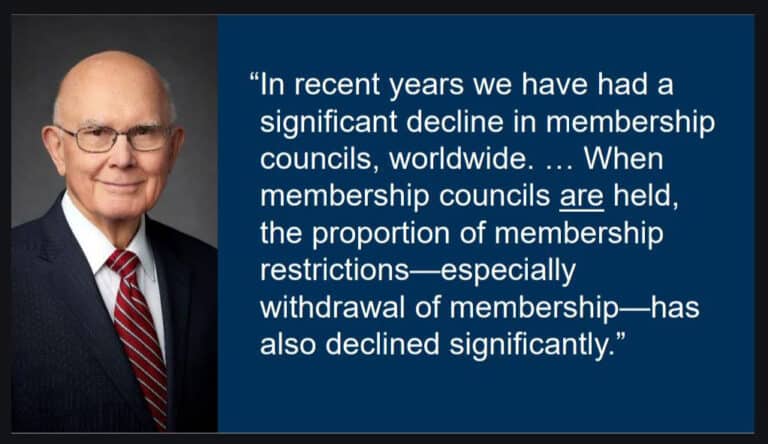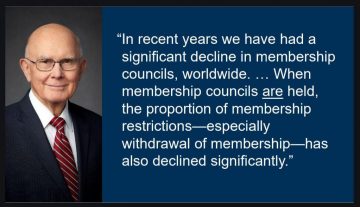Slides from a recent church training have come out with bizarre messaging: “Remember when Jesus let the woman taken in adultery off? Pretend it didn’t happen.”
During a recent leadership training, Elder Dallin Oaks lamented that since 2021 “a decline in membership councils” is occurring in The Church of Jesus Christ of Latter-day Saints. Membership councils are the formal meetings when members are assessed for excommunication.1 Doesn’t it seem strange that a church leader is upset that so few people are being excommunicated these days?
Personally, I think fewer excommunications are a good thing, but unlike Elder Oaks, who directed his remarks to bishops and stake presidents implying they have been slacking on their jobs, I think there are several far more reasonable explanations for the decline, and at least one good reason to be concerned that this training may result in unnecessary harm:
- Church policies have influenced how membership councils are held.
- The list of “serious” sins is now public.
- Violent crime is declining.
- Questionable statistics
- Emphasizing declines could cause unnecessary membership councils.
Membership councils are being run at the ward level, instead of the stake level, where members and their situations are known.
Years back, the 15-member all male stake high council handled all excommunications of endowed individuals, including women. Women were at especial disadvantage in these councils, because they were held by men on a stake level with whom they were unlikely to have any dealings. These men didn’t know the women or their situation, and made decisions in an adversarial format, during which half of the men making a judgment must argue for punishment.
Today bishops and branch presidents to handle disciplinary councils for endowed women. It seems obvious that bishops and branch presidents — men who personally know those who are facing church discipline — might have information about the context of a given infraction, and THAT might explain the decline in excommunications.
If bishops and branch presidents who personally know those taking part in the repentance process are excommunicating less, isn’t this something to celebrate?
The list of “serious” sins and procedures for membership councils is now public.
Before the new General Handbook was published in 2020, only male priesthood leaders like bishops and stake presidents had access to the instructions for membership councils. Because members could not know what these instructions were, there was no way for a member to know if a membership council was being operated fairly or in accordance with church instructions. For example, there are many stories of church members facing church disciplinary councils for masturbation. In fact, the problem was so widespread that in 2010 the church instructed church leaders to stop holding disciplinary councils for masturbation.
Today the General Handbook directs:
“The Savior’s interaction with the woman taken in adultery is a guide2. Although He did not say her sins were forgiven, He did not condemn her. Instead, He told her to ‘sin no more’—to repent and change her life. … Only for the most serious sins does the Church have a set standard on what actions its leaders should take.“
The church’s “serious sins” are mainly crimes: murder, rape, sexual assault conviction, child or youth abuse, abuse of a spouse or another adult, predatory behavior (violent, sexual, or financial), incest, child pornography, plural marriage, or serious sin while holding a prominent Church position, and most felony convictions.
Given this instruction, it makes sense that common acts like masturbation, failing to keep the word of wisdom, fornication, and adultery are not listed among the “serious sins” that require an excommunication. It seems pretty plain that finally bishops and branch president are following the church’s own instruction that these common acts are not serious enough to require serious church discipline, and we’re supposed to be sad about it?
Violent crime is declining.
There’s another very important reason disciplinary councils may be down: violent crimes of the type called “serious sins” by the church are declining significantly in the US.

Violent crime in the US is down and has been falling for decades. LDS make up about 1.1-1.3% of the US population. The number of LDS who are facing formal membership councils at any one time is far smaller — far too small to influence these statistics.
It seems reasonable to assume that LDS are following trends and are committing fewer violent crimes, “serious sins,” such as rape and murder, than in years past. Declining membership council statistics seem to support this conclusion and should be a source of relief, not consternation.
My momma says be skeptical about statistics with ellipses.
The slides claim “In the twelve years following 2010, the repetition of serious sins was far lower for those … who had been held accountable in a membership council than for those who had not.3” We don’t know what text was glossed over by that ellipsis, but I have suspicions about this statement.
Once a member has been excommunicated, they are no longer tracked by the church’s statistical reporting. How, then, could the church know if an excommunicated member repeats serious sins?
My money says that the ellipsis held some sort of qualifier about the population sample. It may have said that those who faced membership council AND RETURNED did not repeat serious sins. I suspect this statistic only shows that those who are willing to comply with the church’s conditions of repentance, are willing to comply with the church’s conditions of repentance. I sincerely doubt that the church has any statistics regarding how frequently someone who is excommunicated and DOES NOT RETURN repeats a serious sin.
I am also skeptical of the slide claim that sin repetition, or recidivism, “was far lower among those … who had been held accountable in a membership council than for those who had not.”4 I’ve already shown that violent crime — “serious sins” — are down for the population as a whole, and that over 98% of the US population is not LDS and has never been in a membership council.
I therefore conclude that recidivism is also down among those who have not been “held accountable in a membership council”.
This means we must question whether any relationship between declining recidivism and membership councils is causal or merely correlated. How has the church drawn its line from membership councils to reduced recidivism given overall declines in violent crime? How do we know these membership councils are actually effective at reducing recidivism?
I think emphasizing declines could cause unnecessary membership councils.
Imagine you’re a bishop and a leader has just told you ministering statistics in your ward are down. You will assess your practices and work to bring them up, of course.
Now imagine he’s told you the number of membership councils held in your ward are down. Will you not assess your practices and work to bring those statistics up?
Surely church leaders don’t want priesthood leaders considering whether they’ve performed the same number of membership councils this year as last or setting a goal for number of membership councils performed.
But if they don’t want priesthood leaders to think that statistics on formal discipline matter, why did they act like it does?
Closing thoughts
I hope that bishops and branch presidents are not distracted by statistical declines in formal church disciplinary proceedings and will focus on their role in helping people — especially women — who are already disadvantaged in church disciplinary councils for many reasons. Statistics, especially questionable ones, should not be the determining factor for whether anyone faces church discipline. Declining crime rates over all, and the church’s own policies are the most likely reason for the decline in membership councils, not slacking priesthood leadership.
It’s hard for me to imagine a circumstance where we should be concerned that membership councils are down.
I’m pleased, to be honest.
Jenny Smith likes Star Trek, tomatoes, and peanut M&Ms, but not at the same time.
- It must be these formal membership councils to which Elder Oaks refers, as informal councils do not result in a paper trail that would leave statistics that could show a decline. ↩︎
- see John 8:3–11 ↩︎
- Emphasis added ↩︎
- Emphasis added ↩︎






4 Responses
Well said!
For me, I read the slides as a rhetorical “circling of the wagons.”
I don’t know the purpose, the context, or the information that didn’t make it to the slide, but it’s crystal clear that the boundaries of acceptable Mormonism are getting smaller.
I also fear a pendulum swing toward extremely fundamentalist ways of thinking paired with increased purging of members.
I got the impression that this call for more excommunications is an effort to purge all the critical members. Once you are excommunicated, your words fall on def ears to active members.
Fall in line, check the boxes, don’t make disruptions or you are out. Devout members/leaders don’t like it when people make them feel uncomfortable.
My bishop threatened a disciplinary council eleven years ago because I submitted a profile to the Ordain Women site. He didn’t get an opportunity to go through with it because his time as bishop came to an end and a new bishop was called (who chose to reverse everything church discipline wise that I’d been put under).
That first bishop would’ve absolutely taken this message as a message from God to excommunicate me. He’s now a counselor in a stake presidency, and I bet he honestly regrets not excommunicating me (because look, here I am blogging about my issues with the church and causing more people to have a faith crisis!).
Even without the counsel it was an incredibly traumatic experience. I can’t imagine having been excommunicated. Oaks calling for this is just going to destroy people’s lives and it makes me so angry at him.
I think bishops quickly see that if a member is excommunicated he is much less likely to work to come back into the church that if the member is just counseled and worked with to repent. I don’t know the percentage of member who just leave, never to return after excommunication, but I have see such statistics and if was a good percentage. But seeing that statistic was way back before Oaks was in the first presidency. And I can’t imagine him discouraging excommunications to keep from discouraging people. But there was some kind of article and it discouraged excommunication for, oh, say, first time adultery or fornication. It said that excommunication is terribly discouraging and a message that the member is unwanted. People give up trying to repent.